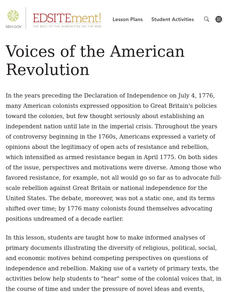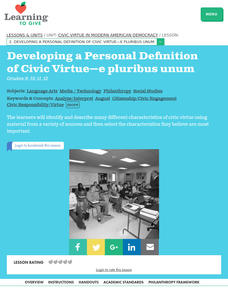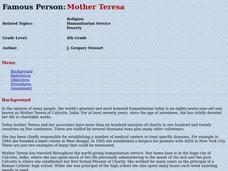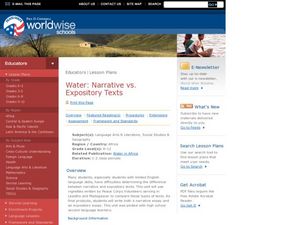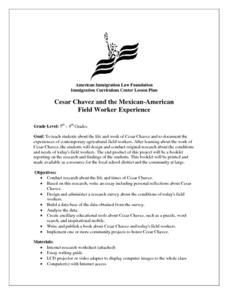Curated OER
The Historical Development of Magnetism
Students discuss the history and importance of magnets to the world. For this magnetism lesson, students write an essay of a world without magnets. Students may research addition information to add details about uses of magnets.
Curated OER
Voices of the American Revolution - Primary Documents
Students use primary documents to examine the attitudes and positions of several factions leading up to the American Revolutionary War. They read documents, debate differing perspectives and write an essay exploring the reasons for revolt.
Curated OER
Civic Virtue in Democracy
Students identify and describe characteristics of civic virtue. Following a class discussion, they create their own definitions of civic virtue. They write essays based on their own definitions and formulate conclusions on the state of...
Curated OER
Jack London's The Call of the Wild: "Nature Faker"?
Middle schoolers take a stand on whether or not London could be dubbed a "nature faker." They support their position with evidence either historical or from the text. Students write an essay, complete with hypothesis and textual support,...
Curated OER
Risks and Benefits
Students research and discuss the risks and benefits of cell phones and driving. They analyze the mechanical and administrative causes of the accident of the Space Shuttle Challenger. They write an essay explaining the risks and benefits...
Curated OER
Mother Teresa
Fourth graders examine the life of Mother Teresa and her contributions to humanitarian services. They listen to a guest speaker, listen to a teacher-led lecture, write an essay, complete journal entries, and participate in a service...
Curated OER
The Holocaust: Concentration Camps
Tenth graders, after reading a variety of passages and watching a video on "Children Remember the Holocaust," explore the concept of brutality of deportation and analyze conditions in concentration and death camps. They review maps and...
Curated OER
2005 USDA Food Guide
In this food pyramid worksheet, 4th graders will answer 6 multiple choice questions about the newest version of the food pyramid (released in 2005), compare and contrast the old and new food guide using a Venn diagram, write a brief...
Curated OER
What's Down There
Students write an essay about the coral reefs. In this oceanography lesson plan, students investigate the reef of Bonaire and compare it to reefs that are not thriving. Students then explore the differences that contribute to the...
Curated OER
Jewish Folktales
High schoolers write an essay and create illustrations of Jewish culture. In this literature-response lesson plan, students read various Jewish folktales. As they read, high schoolers study the geographical, cultural, and historical...
Curated OER
Biography Report- Learning Microsoft Word
Students learn how to use Microsoft Word. In this biography lesson, students participate in mini-lessons on key features of Microsoft Word and then use it to write a multi-part biography report.
Curated OER
Frog Questions
In this frogs worksheet, students first choose a type of frog and research facts about it. Students answer 7 essay questions about habitat, food, body adaptation and protection.
Curated OER
The Nineteenth Amendment: Susan B. Anthony
What would your scholars do if Susan B. Anthony walked into class? Shock them to attention with this instructional activity, which has the school secretary (or any willing participant) dress as the famous suffragette and answer questions...
Curated OER
New York State Testing Program: English/Language Arts Book 2, Grade 4
This 4th grade English/Language Arts standardized test practice activity assesses listening skills. Testers respond to short answer questions and an open-ended essay question.
Curated OER
Who Is That Masked Man?
Fifth graders write a narrative essay describing what happened in the classroom after a nystery person has visited.
Curated OER
Descriptive Paper - And Then There Were None
Students explore And Then There Were None by Agatha Christie. In this characterization instructional activity, students locate passages that contain character descriptions and settings. Students write a descriptive essay on the...
Curated OER
Narrative Peer Editing Worksheet
Need a template for a narrative peer editing worksheet? Reviewers use this worksheet to record their responses to a classmate’s story, commenting on the effectiveness of the story’s introduction, conflict, character development, etc.
Curated OER
Water: Narrative vs. Expository Texts
A reading of vignettes written by Peace Corps Volunteers serving in Lesotho and Madagascar launches a study of the difference between narrative and expository texts. As final products, young writers craft both a narrative and an...
American Immigration Law Foundation
Cesar Chavez and the Mexican-American Field Worker Experience
After researching and learning about the work of Cesar Chavez, your young historians will design a booklet on the conditions and needs of today's field workers and the Mexican-American field worker experience.
Grammar Net
Adjectives of Comparison
Is our car bigger than theirs? Is this car better than than that one? Use comparative and superlative adjectives of provided verbs to complete twenty sentences.
National Constitution Center
Born in the U.S.A: Music as Political Protest
Though often used in shows of patriotism, Bruce Springsteen's 1985 song "Born in the U.S.A." is critical of America's role in the Vietnam war and its treatment of American veterans. High schoolers analyze the song's lyrics in an activity...
University of Pennsylvania
Decoding Propaganda: J’Accuse…! vs. J’Accuse…!
Reading snail mail is a great way to go back into history and to understand others' points of view. The resource, the second in a five-part unit, covers the Dreyfus Affair. Scholars, working in two different groups, read one letter and...
Curated OER
Parrot in the Oven: Pre-Reading Strategy: 4 Corners
A four corners pre-reading activity introduces class members to the major themes in Victor Martinez's award winning novel, Parrot in the Oven: Mi Vida.
Museum of Tolerance
Making Lemonade: Responding to Oppression in Empowering Ways
An activity focused on tolerance encourages class members to consider how they might respond when they or someone else is the target of oppression and discrimination. After researching how some key figures responded to the anti-Semitism...



